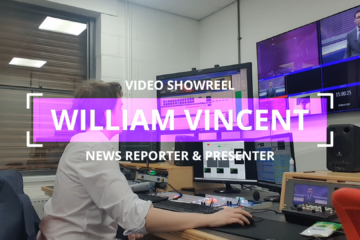Szou is an electro-pop singer-songwriter based in Manchester. She has played in multiple Manchester establishments and her hometown of Chichester. Recently, Szou has been releasing new music about the COVID-19 pandemic. I talked to her about her musical upbringing, her new song Utopia, and female representation in the electronic music genre.
Szou: I’m from an incredibly musical family. I always struggled reading music, so my dad just encouraged me to improvise on our piano in the living room. That’s when I was first like: “Oh! I’m interested in melody and chords and harmonies. I’m not interested in following something that’s on a page.” In high school, my music teacher, who I really didn’t get along with, set us a task to write a Christmas song. And something clicked. It just came so naturally to me that I started quite simply writing songs on the piano. As an 11-year-old I watched Adele at The Brits, I thought: “This is a very simple pop song. I can be Adele,” you know what I mean? Maybe I can do that; maybe I can have a go.
WV: Was Adele one of your role models?
Szou: Well, no. I think that was more of a copycat thing. In terms of my musical influences, I went to a festival and saw a band called Friendly Fires. They use a lot of very, very layered textural synthesisers alongside the indie rock genre. It’s not only catchy, but there’s something about the textures… their sound is euphoric; it elevates you. That’s what I’ve been looking for in other music. I was really into Ellie Goulding in the early days and an artist called SOHN. When I moved to study at The University of Manchester, my music world opened up to the dance music there. I became really interested in the fusion of dance and pop music. Disclosure, Flume, a little bit of the Chemical Brothers…

WV: Your role models have really changed throughout the years.
Szou: Yes. Definitely. I’m impressed by a lot of ambient work and film music too. I’m a massive, massive, massive fan of John Hopkins. He understands the soft, delicate and rhythmic, upbeat moments. Brian Eno: obviously not much needs to be said about him. And obviously, Hans Zimmer is great too because he is a bit of a legend and he’s just really clever with the way he plays with sound.
WV: So, you started making music when you were a kid, but when did you start making music electronically?
Szou: My mum basically let me borrow her laptop with GarageBand. At first, I’d literally stick a microphone in front of my keyboard – really bad, low-quality stuff. But it was really important for me to understand how sound works. After uni, I did this electronic music production course at Spirit Studios that completely opened up the whole structure to production.
WV: How do you look back at your older music today?
Szou: [Laughter] Not great! I think I had all the essential key elements, like a strong chorus, that sort of thing, but the lyrics were awful. It’s taken me years, and I still use those key elements. I still use a catchy chorus, but the production of my new stuff takes it to another level. My new music is not only just catchy: it’s something that I’d enjoy hearing on Spotify myself.
WV: And with your early SoundCloud music, like What Did You Expect, Strobe-
Szou: Oh no!
WV: Yeah, we’re throwing those back! Can you see your progress from those tracks?
Szou: Oh yeah. Massively so. My attention to rhythm has completely changed. Because I wanted to learn things myself, it’s been a long process. And now because I’m open to collaborating with people, I think my music is on a whole other level. Yeah, throwback to Strobe.
WV: Throwback to Strobe! Strobe was catchy.
Szou: Yeah, it was catchy! I’ll give you that.

WV: Let’s talk about your newest releases. Dystopia and Utopia: are they part of a series?
Szou: Yes, but it wasn’t intentional. I wrote Dystopia when it became very apparent that the UK was going into lockdown. It was a very quick escalation. I was constantly going into the supermarket and thinking: “Oh, it’s not just people online saying there’s nothing in the shops: there is nothing in the shops.” People literally believe this is the end of the world. And that ties into my deep love of science fiction, fantasising about if I went to space – if I lived in a dystopia. The reality is so much scarier. For a lot of people, films and fiction are a form of escape. Maybe we’ve been naive to the darkness of it because we had a level of distance. When you read 1984, you think, well, that’s not my life. I wrote the lyrics and set down the backing track quite quickly. I got a girl called Ellie Dixon to mix it for me, making it sound really professional. The whole process was very easy and straightforward, but I think it just came from such a strong emotion. I just got it out of me as quickly as I could.
WV: Did you have a different approach to Utopia?
Szou: Yeah, I moved home from Manchester, and I felt so much calmer. I had to be in a place of safety so that when it felt like the world was falling apart, at least I had my family around me: the people I love. I went to the piano and wrote Utopia. But I had a different attitude because I had this level of calmness; Utopia was about longing. Because one day we’re going to be grooving and we’re going to be drinking with our friends: we’re going to have a great time. There’s a strong sense of hopefulness in Utopia, and I wanted the backing to have more of a dance feel. I think that we need to bear in mind that there is hope, but for now, we got to sit tight, accept it, and be positive for the future.
“We’re going to celebrate and we’re going to be glad to be alive and glad that we’ve changed as people.”
WV: And I’m guessing there are not many opportunities for you to perform live. How has that affected you?
Szou: Well, it’s actually funny you say that because at uni, I did loads of gigs. I actually said to myself I would stop because I recognised that I didn’t quite understand the technology I was dealing with. If I was going to do this electronic thing, I needed to do it right. So I took a break from it. I learnt the simple things like Ableton and all that last year on my electro course. I moved home and did open mics at my local pubs. I booked several Manchester gigs, and they were good gigs and good venues, supporting some really great bands. But obviously, it was very much a case of one email after another saying: “Sorry, it’s cancelled.” I guess it gives me more time to feel even more confident in my abilities.
WV: It seems like Dystopia and Utopia mark the start of your new music approach. A more professional, polished sound that you actually want to produce.
Szou: 100%. For so long, I wanted to be this amazing female producer that can do anything: I didn’t need anyone’s help! But coming home made me realise there’s absolutely nothing wrong with asking for people’s opinion and help to finish things off. I feel more confident now to approach other producers who will do a great job and make me feel good about my music. Until the age of 21, I had no idea what mixing and mastering were. I just thought, OK, I’ll make something on Logic. Yes, it sounds good, but in order to make it sound really, really professional, you need to get help from people.
WV: And you’ve been networking a lot with Manchester-based artists.
Szou: Yeah! Honestly, it seems a bit stalker-ish, but literally messaging someone on Instagram saying “I really like your track” makes you feel like you’re doing the right thing. Making friends who are into the same sort of thing as you makes you feel you’re not alone.
WV: You’ve mentioned on your social media there’s a massive gender gap between female and male music artists: not just in the electronic genre, but in a wide range of genres. How do you view that information?

Szou: I actually do think that I’ve sort of come at the right time? There is a movement of other women like me who want to make big pop songs and want to have that stamp on it. If you look at female artists like Beyoncé or Rihanna, they write great music. But the people that produce their tracks, and to clarify, this is a massive generalisation, are almost always men. You have these amazing, powerful women who write these incredible lyrics and songs, but there is this sense… I know it’s really weird to think about, but there’s a male narrative in them because it’s a male sound. Yes, Beyoncé is probably saying, “I don’t like that. I don’t like that,” but the core backing of the song is made by a man. I just want to hear women’s voices not just in the lyrics, because that’s already happening. I want to hear it in the sound of the song.
WV: That’s really interesting. I haven’t thought of it as the sound of the song.
Szou: Yeah, because, you know… it’s how you hear it. I don’t listen to lyrics personally when I listen to music. I’ve always listened to the different elements – the different layers.I want to see female producers at the heart of commercial pop because if that’s happening at the centre of the biggest selling songs, the Top 10, your ‘New Music Fridays’, then we can hear women’s voices in every kind of way, you know?
WV: So what are your plans for the future?
Szou: I now feel like the songs are at a really good standard. I’m sending my stuff to labels, which a small detail and most people wouldn’t care but for me, having that inner confidence and inner trust in my music is great. I want to release a new song in October and I’m really, really, really proud of this one because I’ve used a lot of acoustic elements. It’s still very much an electro song, but I’ve included a guitar in there: shock-horror! And then there’ll be another song out probably around Christmas time.
WV: Is there any advice you give to female electronic musicians?
Szou: I think it’s so easy for any musician to feel incredibly isolated. As I said, me just accepting that I can’t do it all myself has literally transformed the process. Accepting that you can’t be Wonder Woman, because I think as women we’re like: “Well, I’m going to do this as well as a man and then some!” You can’t always just feel like you’re alone in something. You need other people’s opinions because, at the end of the day, you’re just one person.
Szou’s Utopia is out now on Spotify. You can follow Szou on Twitter and Instagram for future updates and releases.



0 Comments